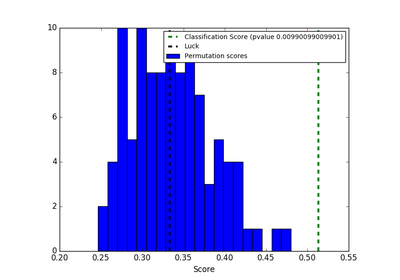sklearn.model_selection.permutation_test_score¶
-
sklearn.model_selection.permutation_test_score(estimator, X, y, groups=None, cv=None, n_permutations=100, n_jobs=1, random_state=0, verbose=0, scoring=None)[source]¶ Evaluate the significance of a cross-validated score with permutations
Read more in the User Guide.
Parameters: estimator : estimator object implementing ‘fit’
The object to use to fit the data.
X : array-like of shape at least 2D
The data to fit.
y : array-like
The target variable to try to predict in the case of supervised learning.
groups : array-like, with shape (n_samples,), optional
Labels to constrain permutation within groups, i.e.
yvalues are permuted among samples with the same group identifier. When not specified,yvalues are permuted among all samples.When a grouped cross-validator is used, the group labels are also passed on to the
splitmethod of the cross-validator. The cross-validator uses them for grouping the samples while splitting the dataset into train/test set.scoring : string, callable or None, optional, default: None
A string (see model evaluation documentation) or a scorer callable object / function with signature
scorer(estimator, X, y).cv : int, cross-validation generator or an iterable, optional
Determines the cross-validation splitting strategy. Possible inputs for cv are:
- None, to use the default 3-fold cross validation,
- integer, to specify the number of folds in a (Stratified)KFold,
- An object to be used as a cross-validation generator.
- An iterable yielding train, test splits.
For integer/None inputs, if the estimator is a classifier and
yis either binary or multiclass,StratifiedKFoldis used. In all other cases,KFoldis used.Refer User Guide for the various cross-validation strategies that can be used here.
n_permutations : integer, optional
Number of times to permute
y.n_jobs : integer, optional
The number of CPUs to use to do the computation. -1 means ‘all CPUs’.
random_state : RandomState or an int seed (0 by default)
A random number generator instance to define the state of the random permutations generator.
verbose : integer, optional
The verbosity level.
Returns: score : float
The true score without permuting targets.
permutation_scores : array, shape (n_permutations,)
The scores obtained for each permutations.
pvalue : float
The returned value equals p-value if scoring returns bigger numbers for better scores (e.g., accuracy_score). If scoring is rather a loss function (i.e. when lower is better such as with mean_squared_error) then this is actually the complement of the p-value: 1 - p-value.
Notes
This function implements Test 1 in:
Ojala and Garriga. Permutation Tests for Studying Classifier Performance. The Journal of Machine Learning Research (2010) vol. 11


